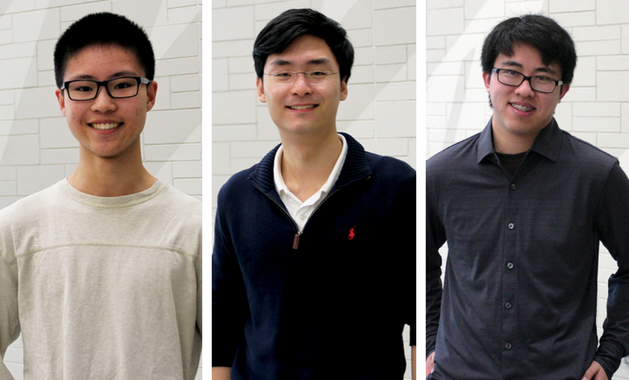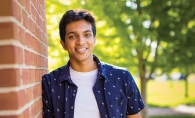
It’s a day that comes around six times per year nationwide that is equal parts anticipated and dreaded by many students. Some take pains to prepare, others wing it and hope for the best. Whatever the approach may be, there’s no denying that the ACT is challenging.
The test is scored on a scale of 1–36; according to the ACT website, the national average from 2014 through 2016 was 21. But these three students of Wayzata High School defied the odds, managing to score a perfect 36, which is only achieved by .1 percent of all test takers. We chatted with these whiz kids to find out their study secrets, future ambitions, and reactions to their scores.
Jeffrey Hu
Graduated: June 2017
College plans: University of Minnesota
Q: Were you surprised to learn that you’d aced your ACT?
A: Yeah, I was pretty surprised. I’d spent most of my early middle school and high school prepping for the SAT. Obviously I was hoping to do well, but I didn’t think I’d get a full score, you know? I think that with the SAT, the questions are a little more in-depth and the ACT is more focused on pacing and doing as much as possible with time constraints. A lot of it overlapped, it covers all the same curriculum.
Q: What is your key to studying for a test like the ACT?
A: I focused on just a few sections that I knew I needed to work on. I knew I’d do pretty well in math, but I had some trouble with reading and science so I just worked on those sections and over time, it just got better and better. To be honest I wasn’t planning on taking the ACT, but when my school made it mandatory to take the ACT, I started studying.
Q: What’s your preferred subject? Why?
A: I like physics. I’ve also taken micro and macro economics. For physics I really like being in the labs because I think it’s really cool to see how the concepts are applied. In economics, my teacher was really awesome, and I found that [economics]
can be applied to pretty much everything that people do.
Q: Any extracurriculars?
A: I’ve been involved with policy debate since I was a freshman. Over the past four years I’ve had the opportunity to travel to Massachusetts, Chicago and Iowa. Last year, I taught debate at a middle school, teaching the basics, verbal and nonverbal cues, and just the basics of speech. You get to meet people all over the country and have all these new experiences.
Q: What are you currently interested in studying in college?
A: I know that I’m going to get an economics degree. I might pursue a double major in economics and computer science, but I’m not sure yet.
Q: What are you looking forward to when you start college?
A: It’s just a lot more independence. In high school you have to do exactly this thing at this time, while in college you can choose your own path and what you explore, so you have a lot more freedom.
William Drew
Graduated: June 2017
College plans: Harvard University
Q: Were you surprised to learn that you’d aced the ACT?
A: When I was taking the test I was feeling pretty confident, I felt like I was doing pretty well, but I was definitely surprised to learn that I’d gotten the full score.
Q: What is your key to studying for a test like the ACT?
A: Just doing practice tests. I know there are a lot of test prep sites. [Classes] also do quite a lot to prepare people as well. I didn’t prepare very far in advance. With school being very busy, I just started studying the week before the test.
Q: What’s your preferred subject? Why?
A: Science and math. I particularly like chemistry and computer science. It’s very precise in general, and a lot of the things you learn in class can be used to explain a lot of things in nature. You can find a lot of ways to apply science in your life, and I just find that really interesting.
Q: Any extracurriculars?
A: In high school, I was the captain of the math and science teams. I competed on the speech team and was also involved at the NHS. I am the captain of a student-run table tennis team, and this year we won the Minnesota State High School Team Championship, which I’m very proud of. Outside of high school, I also coached the East Middle School Math team, and
I volunteer at the Maple Grove Hospital.
Q: What are you currently interested in studying in college?
A: Not entirely sure, but I’m either looking into computer science or neurobiology.
Q: What are you looking forward to when you start college?
A: Probably just to meet the people. Specifically at Harvard, there’s lots of different people there, so just [looking forward] to making a bunch of new friends.
Jason Weng
Graduating: June 2018
College plans: Hopefully Stanford University
Q: Were you surprised to learn that you’d aced the ACT?
A: A little bit, I mean I expected a 34, but to me whether I got a 34, 35 or 36 was based on chance. I’ve been pretty consistent ever since I started taking the ACT in seventh grade when I got a 34, so I expected to do well.
Q: What is your key to studying for a test like the ACT?
A: I think for standardized tests, it’s mostly getting used to the test format. By the time I was a junior, the content on there [was] learned. However the ACT isn’t a test that people usually come across, so you just have to get used to that kind of timing and pressure. Getting used to that pressure is the key to doing well on the ACT or SAT.
Q: What’s your preferred subject? Why?
A: I’d say my favorite subject is policy debate. It’s quite specific, not like math or communications, but debate is one of the more entertaining classes. It’s a lot of work, but it helped me figure out skills that are helpful to everything else, plus it’s just
a lot of fun.
Q: Any extracurriculars?
A: I’m a member of the Wayzata science Olympiad team, a member of the ping pong team, and also take part in the National Economics Challenge, the MN Music Listening Contest, and the NACLO (North American Computational Linguistics Olympiad). I also take piano lessons.
I volunteer at the Maple Grove Hospital as a lobby musician, the Yucai Chinese School, am a member of the Wayzata High School Business Professionals of America, and a member of the math team. I also do research at the UMN in the neuroscience department.
Q: What are you currently interested in studying in college?
A: Not sure. I want to go to Stanford, but it’s a very competitive school. I’ll definitely try for it but there are no guarantees.
Q: What are you looking forward to when you start college?
A: Probably independence, because right now I still rely on my parents for a lot of things. I’ll be forced to think a lot more for myself and make more decisions. It’ll be a challenge but it’ll also be freedom from my parents. My sister is currently a sophomore at a university, and she definitely seems happier.









